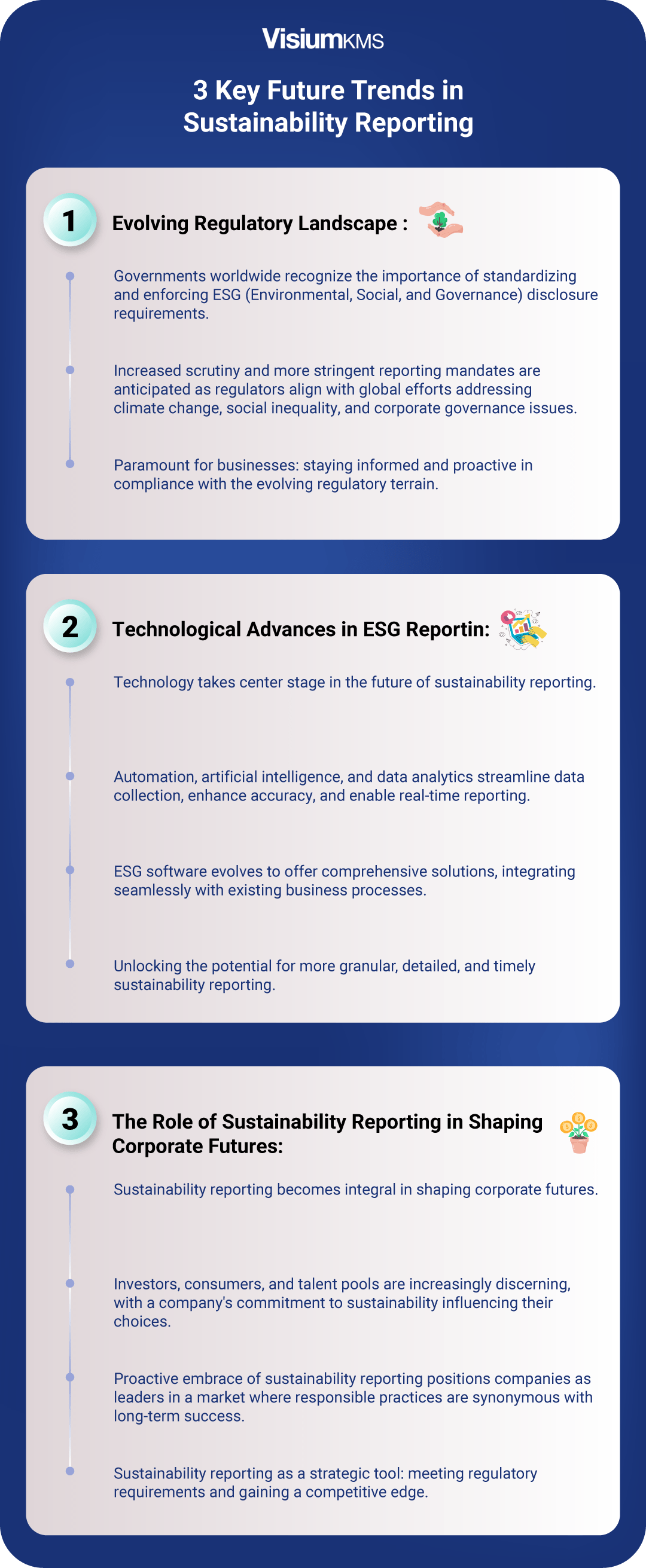The concept of sustainability has transcended from being a mere trend, evolving into a critical driver of corporate strategies worldwide. Central to this paradigm shift is the emergence and significance of sustainability reporting, a practice that goes beyond financial metrics to encapsulate a company’s commitment to environmental responsibility, social impact, and governance integrity. Sustainability reporting entails systematically disclosing a company’s non-financial performance, providing stakeholders with a holistic view of its commitment to sustainable and ethical practices. As businesses increasingly recognize the interdependence between their operations and the broader ecosystem, sustainability reporting has emerged as a powerful tool to convey their dedication to responsible business practices.
This multifaceted approach to reporting not only addresses environmental concerns but also spreads into the realms of social responsibility and governance standards. As companies navigate this landscape, the concept of ESG (Environmental, Social, and Governance) frameworks has become central to understanding and structuring sustainability reporting initiatives. In this blog, we will explore the importance of sustainability reporting within the broader context of ESG frameworks. Let’s get started!
The Essence of Sustainability Reporting
Amidst corporate operations, the essence of sustainability reporting lies in its capacity to harmonize businesses with environmental stewardship, social equity, and governance accountability. At its core, sustainability reporting aligns with the principles of ESG frameworks, offering a structured approach to assess and communicate a company’s non-financial performance.
Defining ESG Frameworks
ESG frameworks serve as the bedrock upon which sustainability reporting stands. Environmental considerations gauge a company’s impact on the planet, from carbon emissions to resource usage. Social factors delve into the company’s interactions with communities, employees, and broader societal implications. Governance aspects scrutinize the internal structures and policies that guide decision-making. Integrating sustainability reporting with ESG frameworks facilitates a comprehensive evaluation of a company’s impact on the planet, people, and its internal governance structures. This comprehensive approach not only aids in identifying areas for improvement but also allows stakeholders to gain a nuanced understanding of a company’s commitment to responsible business practices.
Role of Sustainability Reporting in ESG Frameworks
Sustainability reporting acts as the conduit through which companies translate their ESG commitments into tangible and measurable outcomes. By delineating key performance indicators (KPIs) related to environmental impact, social responsibility, and governance practices, companies can provide stakeholders with a transparent and verifiable account of their non-financial performance. The intricate interplay between sustainability reporting and ESG frameworks is a roadmap for businesses to navigate the complexities of responsible corporate citizenship. This holistic approach enables companies to fulfill their ethical obligations and thrive in an era where consumers, investors, and regulatory bodies increasingly demand accountability beyond financial metrics.
Key Components and Indicators
To unravel the essence of sustainability reporting, exploring its key components and indicators is imperative. From environmental sustainability metrics like carbon footprint and water usage to social responsibility indicators such as employee well-being and community engagement and governance metrics encompassing board diversity and ethical conduct – these components collectively paint a vivid picture of a company’s commitment to sustainable and responsible business practices.
Why is Sustainability Reporting Important?
In recent years, sustainability reporting has emerged as a beacon of transparency and responsibility, pivotal in reshaping the narrative of modern business practices. As we look into the importance of sustainability reporting, a nuanced understanding of the same will reveal its profound impact on corporate dynamics.
Enhance Corporate Transparency
The commitment to openness and transparency lies at the heart of sustainability reporting. By disclosing non-financial performance metrics, companies lay bare their environmental impact, social initiatives, and governance structures. This transparency not only fosters trust among stakeholders but also provides a clear lens through which investors, consumers, and regulatory bodies can assess a company’s commitment to responsible practices.
Build Stakeholder Trust and Credibility
Sustainability reporting bridges trust between companies and their diverse stakeholders. Investors increasingly scrutinize a company’s ESG performance as a key factor in their decision-making processes. By showcasing a genuine commitment to sustainability, businesses can attract conscientious investors, strengthen customer relationships, and build trust with employees. In an era where reputation is a valuable corporate asset, sustainability reporting becomes a strategic tool for fortifying credibility.
Align with Regulatory Requirements
The regulatory landscape is evolving, with an increasing focus on sustainable and responsible business practices. Sustainability reporting aligns with these evolving regulations, ensuring that companies not only meet current standards but also position themselves for compliance with future requirements. Embracing sustainability reporting minimizes legal risks and demonstrates a proactive approach to staying ahead of regulatory changes.
Foster a Culture of Environmental Sustainability
Sustainability reporting catalyzes a cultural shift within organizations, fostering a commitment to environmental sustainability. By quantifying and reporting environmental impact metrics, companies incentivize internal initiatives to reduce carbon footprints, minimize waste, and adopt eco-friendly practices. This cultural transformation extends beyond the confines of corporate offices, influencing suppliers, partners, and the broader business ecosystem.
Sustainability Reporting and Business Strategy
The integration of sustainability reporting into the fabric of business strategy marks a change in how companies envision their role in the global business. Beyond being a regulatory requirement, sustainability reporting becomes a cornerstone of corporate strategy, shaping decision-making processes and influencing long-term trajectories.
Integration of Sustainability into Overall Business Strategy
Sustainability reporting is not an isolated activity but a strategic endeavor deeply embedded within the overarching business strategy. Companies that seamlessly integrate sustainability considerations into their core business practices are better positioned to navigate the complexities of the modern marketplace. This integration goes beyond compliance, transforming sustainability from a checkbox exercise into a driving force for innovation and resilience.
Demonstrating Long-Term Vision and Commitment
A commitment to sustainability is synonymous with a commitment to the future. Companies that prioritize sustainability reporting send a clear signal that they are not merely concerned with short-term gains but are invested in the long-term well-being of the planet and society. This resonates with stakeholders who increasingly seek partnerships with businesses that share a vision for sustainable and equitable growth.
Gaining a Competitive Edge in the Market
Sustainability reporting provides a unique avenue for companies to differentiate themselves in a competitive market. As consumers become more conscious of the environmental and social impact of their choices, businesses that transparently communicate their sustainability initiatives stand out. This competitive edge extends to attracting top talent, as employees are increasingly drawn to companies that align with their values.
ESG Reporting Frameworks
In sustainability reporting, the field is adorned with various frameworks designed to guide businesses in measuring and disclosing their Environmental, Social, and Governance (ESG) performance. Navigating this intricate terrain requires a nuanced understanding of the diverse frameworks available and selecting the most fitting approach for a company’s unique context.
Overview of Different ESG Reporting Frameworks
ESG reporting frameworks serve as structured guidelines for companies seeking to align their sustainability reporting with recognized standards. Notable frameworks include the Global Reporting Initiative (GRI), Sustainability Accounting Standards Board (SASB), Task Force on Climate-related Financial Disclosures (TCFD), and the Carbon Disclosure Project (CDP), among others. Each framework brings its own set of principles, metrics, and reporting guidelines, catering to different aspects of sustainability.
Choosing the Right Framework for Your Business
The selection of an ESG reporting framework is a strategic decision that aligns with a company’s industry, size, and operational context. Understanding the nuances of each framework allows businesses to choose the one that best captures their material ESG issues and resonates with their stakeholders. The choice influences how a company reports and shapes its sustainability strategy and performance.
Standardization and Global Comparisons
Standardization within ESG reporting frameworks facilitates comparability across industries and regions. It allows investors, consumers, and other stakeholders to assess and compare the sustainability performance of companies on a global scale. This standardization also fosters transparency and accountability, contributing to the broader narrative of responsible business practices.
To learn about the role of ESG software in building a more sustainable future, read this.
Looking Ahead: 3 Key Future Trends in Sustainability Reporting
As businesses navigate the aspect of sustainability reporting, the horizon reveals a tapestry woven with emerging trends, regulatory shifts, and technological advancements that will shape the future of responsible corporate practices. Looking ahead, companies must remain agile, adaptive, and forward-thinking to stay abreast of the evolving expectations surrounding sustainability reporting.

Evolving Regulatory Landscape
The regulatory landscape governing sustainability reporting continues to evolve, with governments worldwide recognizing the importance of standardizing and enforcing ESG disclosure requirements. Companies can expect increased scrutiny and more stringent reporting mandates as regulators align with global efforts to address climate change, social inequality, and corporate governance issues. Staying informed and proactive in compliance will be paramount for businesses navigating the evolving regulatory terrain.
Technological Advances in ESG Reporting
Technology is set to play an increasingly pivotal role in the future of sustainability reporting. Automation, artificial intelligence, and data analytics will streamline the data collection, enhance accuracy, and enable real-time reporting. ESG software will evolve to become more sophisticated, offering comprehensive solutions that integrate seamlessly with existing business processes. As companies harness the power of technology, the potential for more granular, detailed, and timely sustainability reporting becomes a reality.
The Role of Sustainability Reporting in Shaping Corporate Futures
Sustainability reporting is poised to become an integral factor in shaping corporate futures. Investors, consumers, and talent pools are becoming more discerning, and a company’s commitment to sustainability increasingly influences their choices. Businesses that proactively embrace sustainability reporting as a strategic tool will meet regulatory requirements and position themselves as leaders in a market where responsible practices are synonymous with long-term success.
Conclusion
The importance of sustainability reporting, leads businesses to the intersection of transparency, responsibility, and corporate evolution. The journey through the multifaceted layers of sustainability reporting has unveiled its critical role in shaping the narrative of modern businesses and their commitment to a sustainable future. We encourage businesses to view sustainability reporting not merely as an obligation but as a transformative journey. A journey that aligns companies with the values of their stakeholders positions them as leaders in a conscientious market and ultimately contributes to a more sustainable and equitable world.
To learn about how to enhance workplace safety with EHS software, read this.
About VisiumKMS
At VisiumKMS, we are committed to staying ahead of the curve. Our process safety management software helps companies maintain all their process safety information in one system, using best-in-class, standardized workflows developed by industry experts! To discuss your needs with one of our experts, schedule a call with us here.

